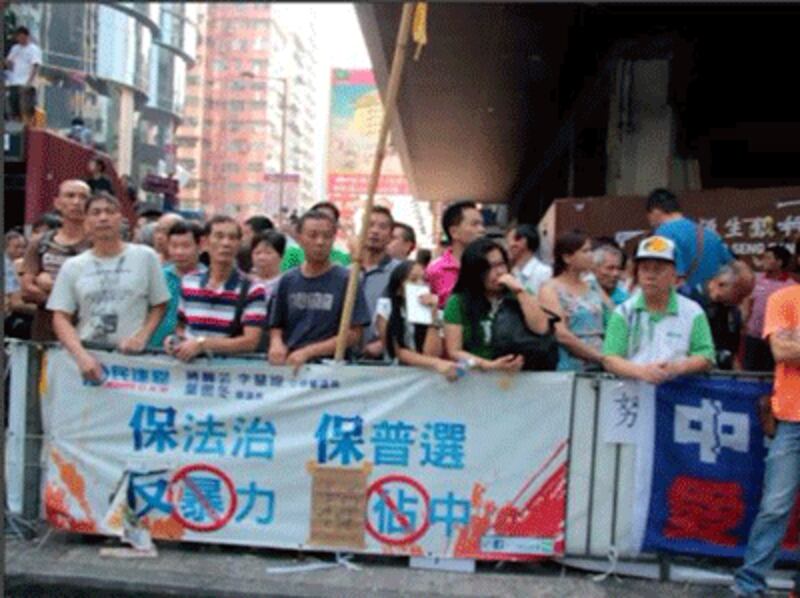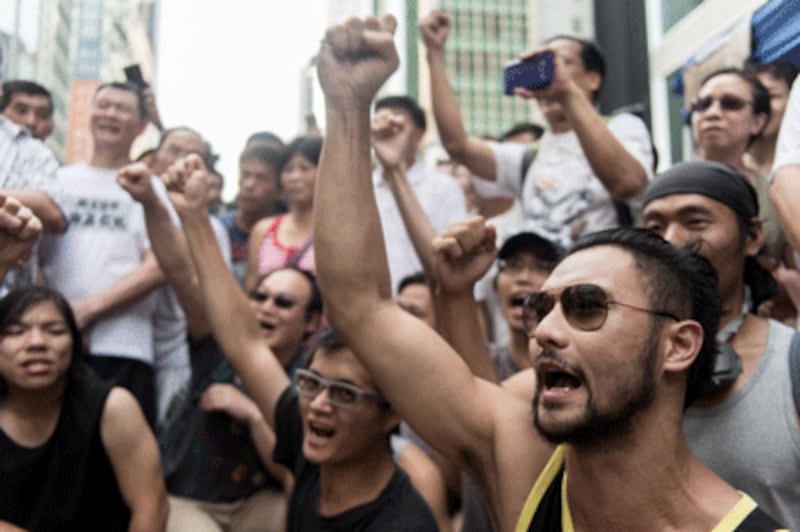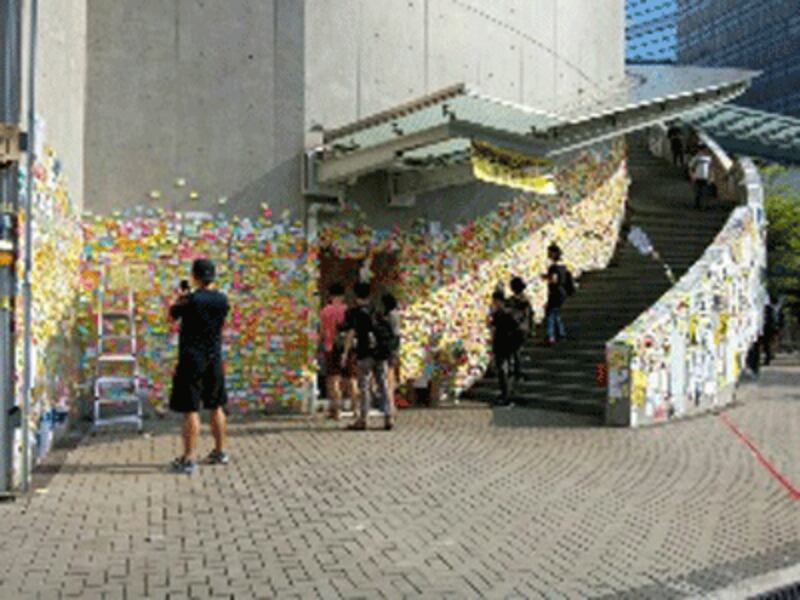Thousands of pro-democracy protesters remained in occupation of key roads and intersections in downtown Hong Kong on Sunday, ignoring a warning by authorities to clear the areas they have blockaded for the last week.
Some 2,000 protesters gathered, some lying down or huddled under large umbrellas, on the main road near the office of embattled Hong Kong chief executive C.Y. Leung in Admiralty district, live video footage from the Apple Daily media group showed.
Meanwhile, a similar number gathered under a makeshift shelter in Kowloon's Mong Kok shopping district, where protesters of the Occupy Central civil disobedience movement were assaulted Friday by those who oppose them.
Tens of thousands of protesters have gathered in key areas of the semiautonomous Chinese territory since last Sunday demanding that Leung step down and that Beijing allow them the right to vote for a leader of their choice in 2017 elections.
While all of the former British colony's five million voters will have a vote, candidates must be vetted by Beijing, making the selection of a pro-democratic politician highly unlikely.
Preliminary talks

Protest leaders have held preliminary discussions with government officials in the wake of an ultimatum set by Leung, who had vowed to "take all necessary actions to restore social order" for civil servants to resume work and students to return to schools by Monday morning local time.
Protest groups such as the Hong Kong Federation of Students (HKFS), Occupy Central and the academic activist body Scholarism issued a joint statement saying that the 3,000-odd civil servants have always been able to access their offices at the heart of the government district.
"The civil service department can tell its staff to return to their normal workplace, and would the government please stop misleading the public," the statement said.
HKFS leader Alex Chow said he was confident the protest organizers could "leave a passage clear for civil servants" on Monday, if the occupation of major roads continued.
"Civil servants are already able to get into the main building, so I think we have already responded to the government's demands," he told reporters.
Photos of the two entrances to the brand new government office complex in Admiralty showed one blocked by metal barricades, while protesters camped near the other had left a narrow walkway to allow civil servants to return to work, according to the South China Morning Post website.
'Proper handling' of standoffs

The protesters are also demanding the "proper handling" by police of any standoff between Occupy and anti-Occupy protesters, after clashes and reports of sexual assault over the weekend sparked criticisms that police didn't do enough to protect demonstrators from attack. About 20 people have been arrested over the clashes, including at least eight suspected to have links to criminal groups, commonly known in Hong Kong as triads, reports have said.
They added that the government shouldn't make withdrawal from main occupation sites a prerequisite for further dialogue. The government and protest leaders have both said they were willing to enter negotiations aimed at ending the impasse but imposed certain conditions
So far, officials haven't agreed to the protesters' framework for talks.
Instead, Leung has repeatedly called for protesters to ensure that things to "go back to normal" on Monday, or risk the use of further police force.
A technical college student among the small crowd outside government headquarters said he hoped to minimize the impact on the daily life of Hong Kong.
"Of course there will be some impact with a movement like this, because that is one of the ways in which it exerts pressure," the student said.
"But I think we will do our best to minimize the impact on the people who work here."
Growing tensions

However, the weekend saw increasing calls for an end to growing tensions between government and protesters.
Two of Hong Kong's busiest shopping districts plunged into chaos on Friday as angry opponents clashed with protesters, tearing down their tents and barricades, amid allegations by pro-democracy crowds that triad criminal gangs backed by Beijing had been brought in stir up trouble.
On Saturday, fresh clashes occurred in Mong Kok, a densely populated working-class district of shops and apartments, with complaints of sexual assaults and attacks on journalists in the crowds.
Violence flared again in the early hours of Sunday in Mong Kok district as riot police used batons and pepper spray to fight back demonstrators who accused officers of cooperating with gangsters, agency reports said.
Meanwhile, two key U.S. senators called on Sunday for a "de-escalation" of the week-long standoff, saying "good faith" negotiations were key to breaking the stalemate.
And former top ruling Chinese Communist Party aide Bao Tong, who served a seven-year jail term in the wake of the student-led pro-democracy protests of 1989, said the Occupy Central movement might consider "taking a break."
"If I were one of the protesters, I would probably want a rest from the debate for a while," Bao wrote, while calling on China's parliament, the National People's Congress (NPC) to rescind an Aug. 31 decision ruling out public nomination of election candidates.
Great deal achieved
He said the Occupy movement had already achieved a great deal.
"The seeds have already been sown, and they need time to lie fallow," Bao wrote in a commentary for RFA's Mandarin Service.
Bao has been under house arrest at his Beijing home since his release from prison.
"No great task can be achieved all at once; they all need some time to gestate," he wrote. "Take a break, for the sake of future room to grow. For tomorrow."
But a technical college student surnamed Zhao at the Admiralty occupation late on Sunday said the movement needed to keep up momentum.
"I think if you're going to protest, you have to do it to the bitter end," the student said. "I want to continue to protest until we get genuine universal suffrage."
Pro-democracy campaigners and pan-democratic politicians have dismissed Beijing's electoral reforms as "fake universal suffrage."
"I think we should be allowed to elect a chief executive who has the genuine support of our citizens," Zhao said.
"I think that I and others will remain here in protest, as long as the police don't use violence to clear the area."
Rubber bullets
Occupy Central co-founder Benny Tai has called on protesters to withdraw immediately if there is any use of rubber bullets or worse.
And HKFS' Chow has said whether or not to withdraw is ultimately for individuals to decide.
A protester in Admiralty who gave only a nickname A Moon said she had come out in anger after police fired tear-gas and pepper spray at protesters last Sunday.
"There is also what happened in Mong Kok two days ago," she said.
She said she recognized the disruption to daily life caused to Hong Kong. But she said: "It shouldn't be up to some violent individuals to clear the area of protesters."
The use of umbrellas by Occupy protesters as a defense against pepper spray, as well as shelter from passing thunderstorms and downpours, has earned their movement the nickname "the Umbrella Movement."
Support for students
Meanwhile, a woman surnamed Wong said she supported the students.
"These students are adults, and they can make their own decisions, so if they want to leave, they can, and if they want to stay, I don't think the heads of the universities can make them leave," she said.
"I work in Central, and the government says that this will affect traffic, but I don't get that feeling."
"I am very angry and sad that the government has responded in this way to peacefully protesting students," she said.
More than 80 academic staff from all of Hong Kong's universities on Sunday called on the government to engage the students in rational dialogue, respond with "concrete action," and show restraint in handling the protests.
"We are opposed to the use of brutal force on our people, whose pure intention is to seek rational dialogue with the government," the scholars said in a statement sent to local media.
"If indeed the authorities are to go down the path of brutal suppression, not only will the current political stalemate continue, but it will also trigger futher escalation of conflicts in this community and bring about more rigorous counter-action," it said.
Time-frame for talks
Academics have called for a committed time-frame for discussions between Occupy supporters and the government, the South China Morning Post reported.
Meanwhile, a top professor at the Hong Kong University's medical school refuted earlier police claims that tear-gas is harmless to human health.
"I am very surprised that the police force who are in possession of potentially lethal or harmful weapons seem to have no knowledge of the possible harms of these weapons," Ronnie Poon wrote on his Facebook page.
He said that tear-gas can result in injuries or cause acute lung problems, depriving parts of the body of oxygen.
Reported by Lin Jing and Hai Nan for RFA's Cantonese Service, and by Yang Fan for the Mandarin Service. Translated and written in English by Luisetta Mudie.
